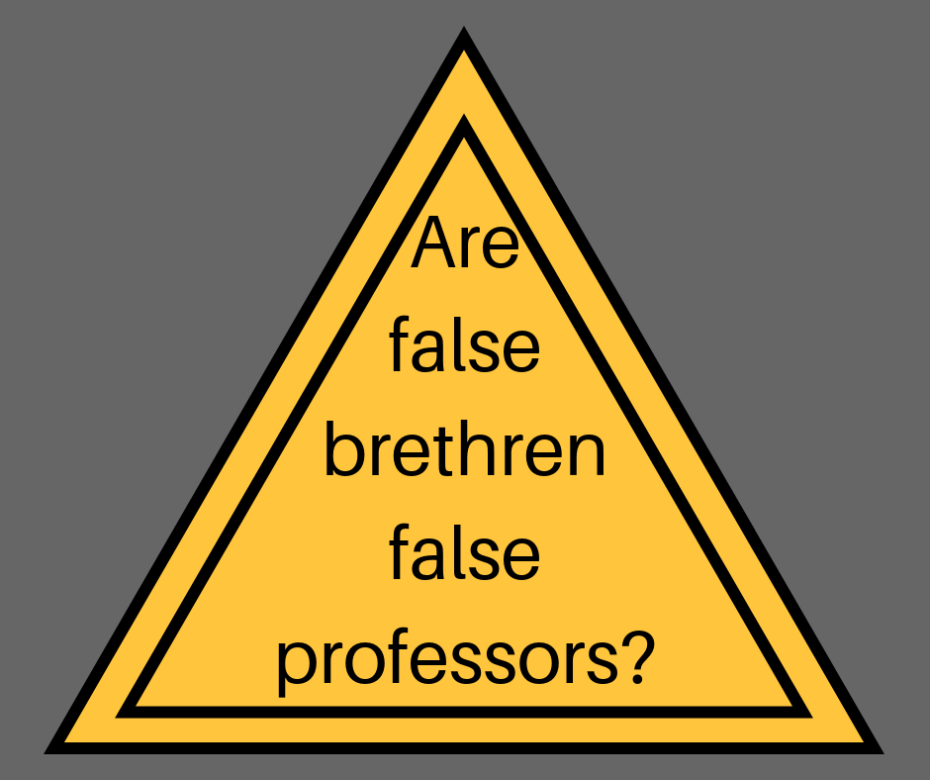The expression false brethren (pseudadelphoi) only occurs twice in the NT. One of those uses is in Gal 2:1-5:
Then after fourteen years I went up again to Jerusalem with Barnabas, and also took Titus with me. And I went up by revelation, and communicated to them that gospel which I preach among the Gentiles, but privately to those who were of reputation, lest by any means I might run, or had run, in vain. Yet not even Titus who was with me, being a Greek, was compelled to be circumcised. And this occurred because of false brethren [emphasis added] secretly brought in (who came in by stealth to spy out our liberty which we have in Christ Jesus, that they might bring us into bondage), to whom we did not yield submission even for an hour, that the truth of the gospel might continue with you.
Fifteen to twenty years ago I was teaching this passage at Victor Street Bible Chapel. I suggested that false brethren referred to born again people who were not living in a manner consistent with the faith. Zane Hodges was listening, and I remember him correcting me, something he rarely ever did. He pointed out that the only other use of this expression is in another passage by Paul where it clearly refers to unregenerate people, people who are not believers. He pointed to 2 Cor 11: 13, 26.
Those two verses read as follows:
For such are false apostles [pseudapostoloi, emphasis added], deceitful workers, transforming themselves into apostles of Christ.
…in journeys often, in perils of waters, in perils of robbers, in perils of my own countrymen, in perils of the Gentiles, in perils in the city, in perils in the wilderness, in perils in the sea, in perils among false brethren [pseudadelphoi, emphasis added].
Zane pointed out that there can be no question but that false apostles were not apostles who simply were not walking properly. They were imposters. So, too, he said, a few verses later when Paul speaks of false brethren, he is speaking of imposters.
So what are false brethren in the NT? They were men, in most cases traveling teachers, who called themselves believers in Christ, but who in reality were not. Often scholars call these men Judaizers. That is, they were saying that in order to be born again, men had to be circumcised and had to keep the Law of Moses.
We have an example of such men just before the Jerusalem Council. In Acts 15:1 we read, “And certain men came down from Judea and taught the brethren, ‘Unless you are circumcised according to the custom of Moses, you cannot be saved.’” This led to a dispute with Paul and Barnabas, and ultimately it led to the Jerusalem Council of Acts 15:6-29.
In Acts 15:5 Luke refers to “some of the sect of the Pharisees who believed rose up, saying, ‘It is necessary to circumcise them, and to command them to keep the law of Moses.’” Note the differences with the false brethren of Acts 15:1. Luke says that these Pharisees believed. He does not say that of the Jews from v 1. In addition, the false brethren of v 1 were arguing for circumcision as being necessary for salvation. The Pharisees of v 5 say nothing about salvation. Their concern is that Gentiles need to be circumcised and to keep the Law of Moses in order to be sanctified. While both were wrong, the former were false brethren, and the latter were true brethren.
The false brethren of Acts 15:1 were evidently saying that belief in Jesus Christ was necessary to be saved (or else how would they even get a hearing), but was not enough. One also had to submit to circumcision and then to keep the Law of Moses.
Are there people like that today? Absolutely! There are people who say that you must not only believe in Christ, but you must be baptized, turn from your sins, and obey Christ faithfully your whole life. Others say that faith in Christ is submitting to His Lordship, obeying Him, and persevering in faith and good works until death.
The strange thing today is that some who are proclaiming a works salvation message are confused believers. They once believed the message of John 3:16. Later they adopted works salvation. I don’t think we should call such people false brethren, for they are indeed brethren. But they are brethren who are no longer sharing the truth of the gospel correctly (as was the case with Peter and Barnabas as recorded in Gal 2:11-21).
Beware of false brethren.


